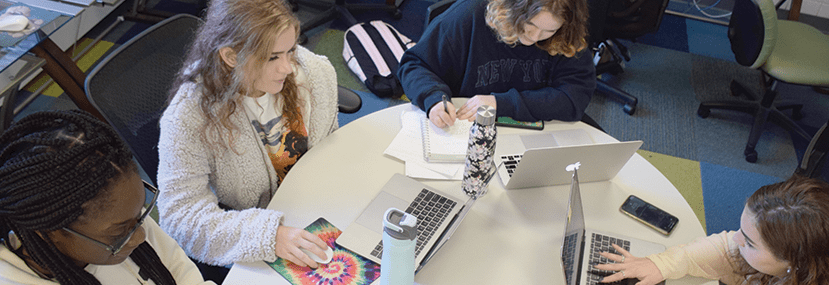
Fit for the 21st Century–Humanities Hub
Steve Jobs is not the only person to have believed that technology alone is not enough. Count UMass Boston in. Add the Mellon Foundation. Include a little creative collaboration between IT and the College of Liberal Arts, and what you get is a Humanities Hub fit for the 21st century.
It all began in late 2018 when the Mellon Foundation gifted UMass Boston $515,000 to create high-impact humanities programming. David Terkla, dean of the College of Liberal Arts, hit the ground running and, thanks to collaborations with staff members in both IT and the Facilities Department, UMass Boston’s Humanities Hub is well on its way.
“I’m thrilled with how quickly this all came together,” says Terkla. “It took shape when our new vice chancellor for IT, Ray Lefebvre, jumped right on it. Together, we discussed what kind of equipment we’d need and how best to set it up. In the course of our discussions, Ray introduced me to the Google Jamboard. I wasn’t familiar with this interactive whiteboard, which is perfect for students working in groups, brainstorming, or sharing presentations.”
Terkla also gives a shout-out to John Jessoe, manager of Classroom Technology and AV Services in IT Communications and Infrastructure Services. “John was exceptionally helpful in getting the equipment,” says Terkla.
“I worked closely with David to understand his needs,” says Jessoe. “David envisions the Humanities Hub as a shared space. So we needed to choose equipment to accommodate a variety of uses. Together, we decided on an AV system with a resident computer and teaching cart. We also decided to add a Google Jamboard.”
When space on the eighth floor of the Joseph P. Healey Library was identified as the hub’s home, Joseph Corkery, a project specialist in the Facilities Department, joined the team. He handled the bid process for painting the space and laying the carpet. Corkery’s responsibilities also included overseeing electrical work and whatever else was needed from a facilities standpoint.
“Early on, we had meetings with everyone involved,” says Corkery. “Dean Terkla and a couple of people from his office, John Jessoe, Jamie Soule—we planned it all out together. It was an experienced team, and everyone knew their role and what to do.”
The formal title of the Mellon grant is “High Impact Humanities: Connecting Curriculum, Community and Careers for Student Success,” a lofty title with worthy goals. So, what exactly does this mean?
“Think of the Humanities Hub as a humanities incubator,” says Terkla. “By providing seed funding and pedagogical training for innovative humanities teaching, faculty will be encouraged to create new high-impact courses. We’ve already developed 24 new courses and are in the process of creating an upper-level curriculum to help students experience the dynamic creativity, analytical thinking, and cultural engagement that is central to the humanities.”
Given Boston’s standing as a social and cultural hub, Terkla says plans include integrating classes within the local community. Site visits, hands-on research, and museum and library partnerships will be built into the curriculum, helping students understand problems from a humanities perspective.
“The way this project evolved is exactly the way any project should evolve,” says Terkla. “IT and the academic side of the house collaborated to benefit our students. IT listened to what we were trying to do and looked into innovative ways to make it happen.”